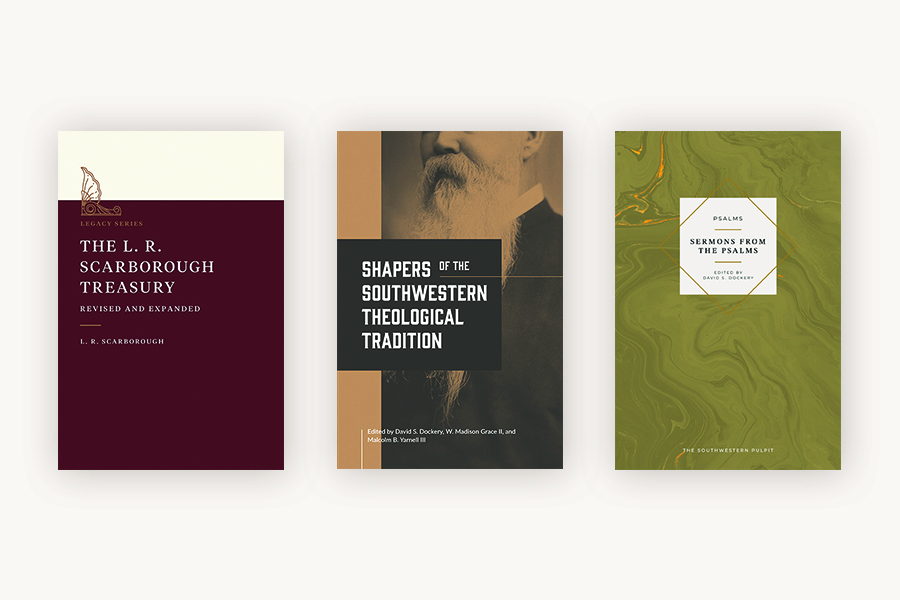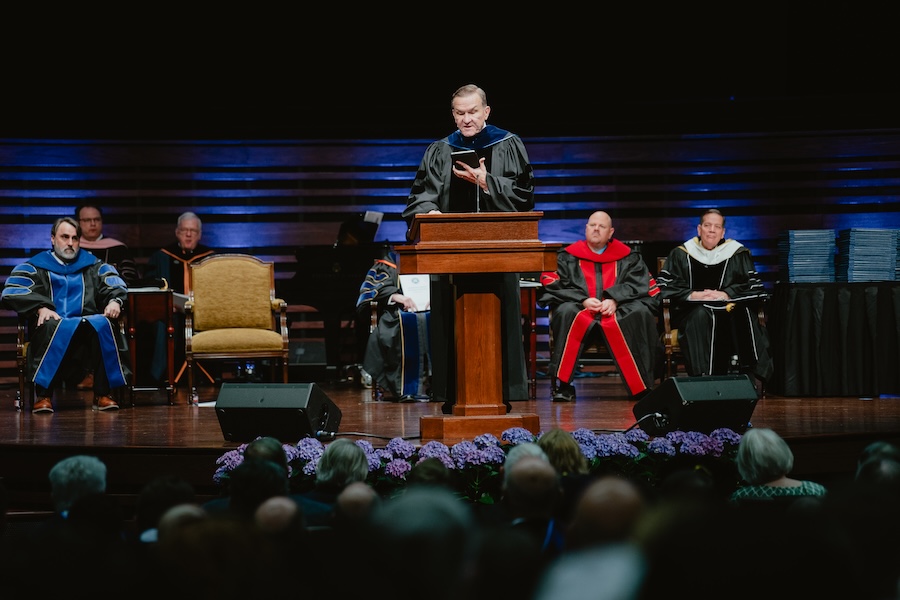FIRST-PERSON: The wondrous mystery of Kingdom growth

Next to the railroad tracks by the Southwestern Seminary campus, professor Matthew McKellar and master’s student Marko Juricek shared the Gospel with a man on his front porch. The man had not been to church since he was a child, but he listened to the Southwesterners with increasing interest. When they concluded their Gospel presentation, the Southwesterners asked the man if he would like to pray and trust Jesus to save him. The man affirmed his readiness to give his life to Christ.
“We led him in a sinner’s prayer and then prayed for him and rejoiced with him,” says McKellar, associate professor of preaching. “This was yet another divine appointment. … The Lord is working!”
Stories like this one circulate the Southwestern campus year-round. Students and faculty share the Gospel, often with complete strangers, and God performs amazing works to bring the dead to life and glorify His name.
As a broader example, consider the recently released results of Southwestern’s missions and evangelism practicums for the 2017-18 school year: 232 students collectively made 2,860 Gospel presentations and saw 552 professions of faith. That means each student, on average, presented the Gospel roughly 12 times and saw two people come to faith in Christ.
We often take this for granted, but the fact that people can hear the Gospel, respond in faith, and be changed for eternity is truly awe-inspiring. Jesus Himself spoke of this mystery:
“The kingdom of God is like a man who casts seed upon the soil; and he goes to bed at night and gets up by day, and the seed sprouts and grows—how, he himself does not know. The soil produces crops by itself; first the blade, then the head, then the mature grain in the head. But when the crop permits, he immediately puts in the sickle, because the harvest has come” (Mark 4:26-29).
Here, Jesus acknowledges that the process whereby seed-sowing (spreading the Gospel) results in a harvest (Kingdom growth) is a mystery (at least to man). The farmer (the evangelist) does not know how it works.
One commentator on this passage notes the contrast between the efforts of the sower, who merely scatters seed upon the soil, and the development of the harvest; for the seed sprouts and grows apart from his action, and he himself does not know how. Jesus’ point, the commentator explains, is that “the kingdom of God begins with the apparently insignificant action of ‘sowing’ the message, but will finish as a great harvest.”[1]
Another commentator affirms, “The success of the Christian message similarly does not depend upon human effort or understanding—though Christians certainly need to scatter the seed—but upon divine power. It will succeed precisely because God is active.”[2] The parable is thus “oriented to the idea of the power released through the scattering of the seed.”[3]
The answer to the mystery of Kingdom growth, then, is that God is at work during evangelistic conversations. We cannot see it, and perhaps we do not understand it, but when we share the Gospel, even with complete strangers, God, through the Holy Spirit, is at work in the situation on a spiritual level. The person whom we evangelize may not come to salvation during that specific encounter, but a seed is planted, and God works within that individual to see the seed sprout and grow.[4] Therefore, while our efforts are not unimportant, God is the most crucial participant in the evangelistic encounter.
This truth is made explicit in the story of Lydia’s conversion in the book of Acts:
“And on the Sabbath day we went outside the gate to a riverside, where we were supposing that there would be a place of prayer; and we sat down and began speaking to the women who had assembled. A woman named Lydia, from the city of Thyatira, a seller of purple fabrics, a worshiper of God, was listening; and the Lord opened her heart to respond to the things spoken by Paul” (Acts 16:13-14).
The Lord opened her heart. Lydia’s salvation was not dependent on Paul’s Gospel presentation (though the text, crucially, does specify that he made one). Scripture makes no mention of his use of a conversation-starter, a transition into spiritual things, a compelling retelling of the story of Jesus, or an effective invitation. Paul’s presentation likely included all of these things, but the emphasis is not placed on his role in the process. Rather, God Himself is credited with saving Lydia. Imagine that.
This likely is not new to you, but reminding ourselves of how mysterious the evangelistic process is—not to mention how miraculous—is a worthwhile endeavor. For while the above exposition of Mark 4 and Acts 16 may not be new, it is profound. God is at work in our evangelism, and on a level almost completely outside our understanding.
Here are at least two applications of this:
1. Understand that God is the one who brings the harvest; we do not. Doesn’t this take the pressure off? Sure, we still have to scatter seed, and we surely must do so wisely; but even so, God takes responsibility for the results. Suddenly, the evangelistic task doesn’t seem so daunting, does it?
2. Let us praise God for being so awesome. He works to grow His Kingdom in ways we cannot even understand, and yet He invites us to participate in the process by sowing the seed. What an honor! Our Lord is highly to be praised, indeed.
That a man would hear the Gospel for the first time since childhood and then give his life to Christ on his front porch is a mystery. That 232 people would share the Gospel 2,860 times and see 552 people surrender their lives to the lordship of Jesus Christ is a mystery. But this is what the Kingdom of God is like. Our job, as sower-evangelists, is to cast seed upon the soil; from there, it will sprout and grow, for this is “the wonder of the mysterious, God-given result of [our] work.”[5] This is how the Kingdom of God grows—the Holy Spirit opens hearts to respond.
[1] Larry W. Hurtado, Mark, New International Biblical Commentary, vol. 2 (Peabody, MA: Hendrickson Publishers, Inc., 1983), 77.
[2] James A. Brooks, Mark, The New American Commentary, vol. 23 (Nashville, TN: Broadman Press, 1991), 85.
[3] William L. Lane, The Gospel According to Mark: The English Text with Introduction, Exposition and Notes, The New International Commentary on the New Testament (Grand Rapids, MI: William B. Eerdmans Publishing Company, 1974), 169.
[4] Lest this metaphor be stretched too far, bear in mind the context in which Jesus delivers it. Jesus begins Mark 4 with the parable of the four types of soil, with only one type of soil yielding a crop. Thus, not every Gospel conversation will lead to salvation.
[5] Hurtado, Mark, 77.



